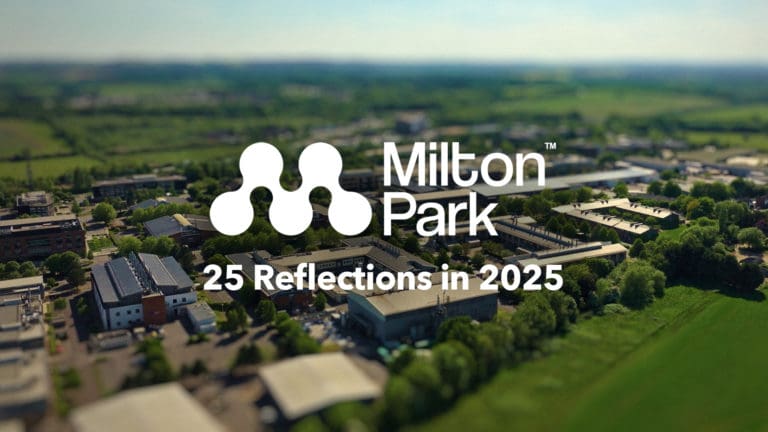24 July 2025
Didcot Powerhouse shows the future of community investment
Back to results
Article originally featured in Business Matters, written by Marjorie Neasham Glasgow BEM, HM Lord Lieutenant of Oxfordshire
In just three years, a medium-sized market town has cracked a code that’s eluded community development experts for decades. The Didcot Powerhouse Fund, of which Milton Park is a founding member and quantum donor, has delivered £400,000 in grants to nearly 9,000 residents, proving that when local businesses and civic leaders work together, they can achieve remarkable results.
Powerhouse’s impact
Didcot’s success is all the more remarkable given its context. Surrounded by world-class science campuses and the prosperity they bring, the town is simultaneously home to pockets of serious social and economic deprivation. This stark inequality demanded a fresh model for corporate giving – one that could bridge the gap between the wealth generated by cutting-edge research facilities and the struggling families living in their shadow.
The fund’s approach offers a blueprint for addressing one of Britain’s most persistent challenges: how to harness private sector resources for genuine community benefit. Within five months of launching, it had generated £100,000 in grants. By year three, it had distributed 70 grants across Greater Didcot’s 46,000 residents, tackling everything from domestic abuse support to youth skills training.
What makes Didcot remarkable isn’t just the money – it’s the method. The fund, chaired by Oxfordshire Deputy Lieutenant Elizabeth Paris, doesn’t simply write cheques. It convenes businesses, charities, local government and faith leaders in the same room, mapping community needs and systematically filling gaps. This year’s annual impact event, hosted by the European Space Agency, drew 160 guests who would rarely otherwise meet.
Corporate social responsibility
This model represents a fundamental shift from traditional corporate social responsibility. Rather than companies making isolated charitable donations, the Didcot approach creates sustained partnerships that leverage professional networks, legal expertise and grant-writing skills alongside financial resources.
The success reflects a broader civic renewal happening across Britain, much of it led by the country’s 5.5 million small and medium enterprises (SMEs). Across the UK, these businesses are showing what it means to contribute not just economically, but socially, to their local communities. They do so quietly — through their skills, relationships, and a belief in stewardship.
Last winter, fuel-allowance reductions left many families wondering how to heat their homes. In East Yorkshire, a coalition of community groups and local firms mobilised at speed, distributing tens of thousands of pounds in emergency vouchers. Similar efforts in Bottisham, Great Wilbraham, and Ruddington reached nearly 300 residents with targeted help. These acts made all the difference close to home.
SMEs employ 60% of the UK workforce, but their real power lies in their embeddedness within local communities. They understand local needs in ways that distant corporations or central government cannot.
Empowering local community groups
Through my role as Lord Lieutenant of Oxfordshire, alongside our team of 40 Deputy Lieutenants, I witness this transformation first-hand. We engage with tens of thousands of people annually and can report that this quiet civic renewal is both important and accelerating.
From the Isle of Wight, where former vehicle technician Jan retrained as an energy retrofit assessor to help neighbours cut bills and carbon emissions, to East Yorkshire, where community groups and local firms mobilised to distribute emergency fuel vouchers, SMEs are proving themselves to be critical civic actors.
The most striking example may be Inveraray on Scotland’s west coast, where the historic Local Pier had been shuttered for a decade. A local charity, supported by an SME, raised over £275,000 across seven funding bids. The pier reopened in April 2024, now hosting monthly farmers’ markets. As Linda Divers, Chair of Inveraray Community Council, said at the ribbon-cutting: “That vote of confidence turned a dream into reality.”
This matters because trust – the foundation of effective community action – is built through personal relationships. A 2023 King’s College London study found that 98% of UK residents trust people they know personally. SMEs, rooted in their communities, are uniquely positioned to nurture and leverage this trust.
SMEs the engine room of growth
Parliament is taking notice. The Business and Trade Committee has launched an inquiry into what small firms need to thrive, with Chair Liam Byrne calling them “the engine room of growth and our biggest employer.”
The potential is enormous. Imagine businesses helping food banks become comprehensive community hubs. Picture digital skills clinics helping charities navigate AI-ready grant applications. Envision hundreds more professionals like Jan, retrained into green jobs that serve both local communities and environmental goals.
The Didcot model shows this isn’t utopian thinking – it’s happening now. What’s needed is recognition that the story is changing: from business as standalone economic actors to businesses as community builders, aligned with local purpose.
The work is quiet, relational and transformative. In an era of declining social capital and institutional trust, it offers hope that Britain’s communities can rebuild themselves from the ground up. We should celebrate it – and help it grow.




